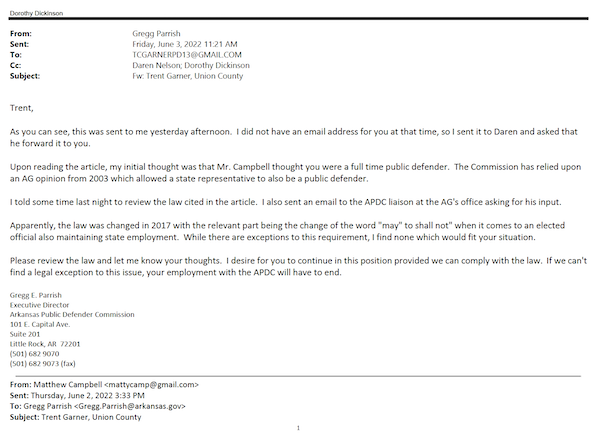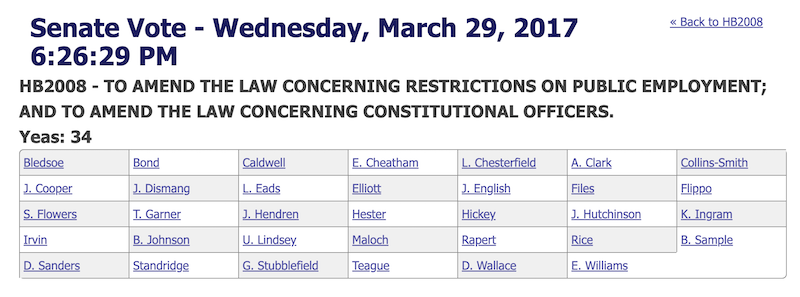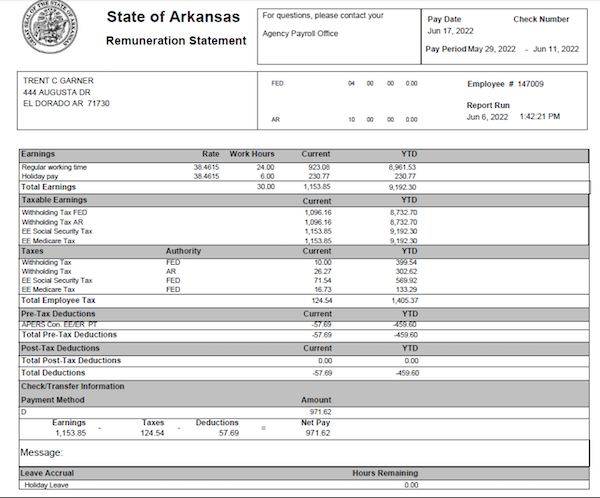I should know better by now.
After twelve years1 of writing about this kind of stuff, I should just assume that the answer to every “why” question is a combination of hubris and opportunistic greed. Because, more often than not, it really is that simple.
Despite knowing this on a basic level, after I finished the most recent post about Sen. Trent Garner’s illegal acceptance of a job as a public defender in south Arkansas, I was going in circles trying to make sense of the timing. Specifically, I couldn’t figure out why, after five years in the legislature, Garner would suddenly, illegally take a state job in the spring of his final year in office, when waiting until January would seemingly have made the hiring legal?
After all, if something that had happened and Garner was suddenly so desperate for money that he needed more than his senate salary and sketchy claims for mileage and per diem provided, why not resign the senate seat and get a single job that paid more, rather than taking on a second job that was located so far from your first one? Since the senate job is ending in January, this second gig was only going to be additional income for nine months or so anyway.
On the other hand, if the public-defender job was just designed to be résumé padding for a future judicial run, as has been speculated, why start the job in March when it would be illegal, rather than in January, since the next judicial election won’t be until 2024 anyway?
I kicked around all sort of theories and possibilities, but none of them made all of the pieces fit together neatly.
None, that is, except for hubris and opportunistic greed. I really should know better by now.
***
Due to the pandemic2, courts in Arkansas put a freeze on jury trials, including criminal jury trials, starting in mid-March 2020. The problem is, a pause in jury trials does not equal a pause in new criminal charges being filed. And so a pretty hefty backlog of criminal cases began to pile up, to the point that, by the end of summer or early Fall 2021, as things were beginning to appear like they might get back to normal, public defenders and prosecutors began to worry about how they would possibly catch up on a year and a half or so of extra cases that had built up on top of their usual case load.
Around this time–late summer/early Fall 2021–some legislators, including Sen. Clarke Tucker, began talking to public defenders, prosecutors, and other legislators to create a plan to deal with this backlog. By December or January, the conversations about fixing this issue ramped up, and pretty much everyone in the legislature was on board, either tentatively or explicitly, with a plan to allow public defender and prosecutor’s offices to hire private-practice attorneys to act as additional, temporary deputy public defenders and deputy prosecutors. The would be introduced in the 2022 fiscal session as SB107, SB108, SB109, and SB110: SB107 (prosecutors) and SB109 (public defenders) would permit and fund the extra hirings for the remainder of the 2021-2022 fiscal year, while SB108 (prosecutors) and SB110 (public defenders) would permit and fund the same positions for the 2022-2023 fiscal year of July 1, 2022 through June 30, 2023.
The important takeaway at this point, however, is that, by January 2022, more or less everyone in the legislature was aware of both the problem of criminal-case backlogs and the solution that was being crafted in the form of hiring private attorneys on a short-term basis. Keep that in your pretty little heads as we move forward.
***
Right about here is where we could all likely benefit from a timeline. After the initial post went up last week, Ms. Blue Hog and I pored over Sen. Garner’s social media accounts, the Arkansas Secretary of State website, and other public records, putting together a sort of “What We Know” dossier. I also sent FOIA requests to a number of agencies, including the prosecutor in Union County, the Arkansas Public Defender Commission, and the public defender for Union County.
January 10, 2022 — Garner announces he’s not running for re-election.
January 21, 2022 — Garner forms the Law Office of Trent Garner, PLLC.
February 14, 2022 — The Arkansas General Assembly begins the 2022 Fiscal Session.
February 28, 2022 — Sen. Clarke Tucker introduces Senate Bills 107 through 110, and those bills are referred to the Joint Budget Committee (see, e.g., here).
March 3, 2022 — Sen. Tucker presents all four bills to the Joint Budget Committee, which returns the bills to the Senate with a Do Pass recommendation.
March 7, 2022 — The Arkansas Senate votes on Senate Bills 107 through 110. SB 107 and 108, dealing with prosecutor hirings, pass 34 yea, 0 nay, and 1 present; SB 109 and 110, dealing with public defender hirings, pass 35 yea, 0 nay.
March 8, 2022 — The Arkansas House of Representatives votes on the four bills. SB 107 and 110 pass 98-0, while SB 108 and 109 pass 97-0. The bills were transmitted to the Governor’s Office, and the Governor signed them the same day.
March 15, 2022 — The Arkansas General Assembly adjourns side die from the 2022 Fiscal Session.
April 5, 2022 — Garner texts Daren Nelson, managing public defender for the 13th Judicial District, to confirm a meeting between them the following day at 2pm.
April 6, 2022 — Garner and Nelson meet.
April 8, 2022 — Garner accepts a 13th Judicial District public defender position that was created and funded pursuant to SB 109.
April 11, 2022 — The 13th Judicial District public defender’s office contacts Garner to tell him that, because he’s also a Senator, he will need to fill out an additional dual-employment form and won’t be able to start his new job until April 12.
April 12, 2022 — Garner’s first day as a public defender. According to his on-boarding documents, he was to work Monday through Friday, for six hours per day.
June 1, 2022 — Someone at the public defender’s office texts Garner to tell him that “A female named Austin Bailey called–Claims she’s just trying to verify employment.” Garner responds, “Reporter with Arkansas Times, I would suggest to say we don’t discuss employment.”
June 2, 2022 — The first Blue Hog Report post about the illegality of Garner’s public defender job goes live. A link to that post was sent to Gregg Parrish, Executive Director of the Arkansas Public Defender Commission.
June 3, 2022 — Parrish speaks to Garner by email and phone, ultimately informing him that the Blue Hog Report post was correct and that Garner would have to terminate his employment as a public defender. Garner tenders his resignation the same day.
If this were some other legislator, perhaps this is where the story would end, with his having resigned immediately once this came to light and a certain blogger doing slightly too much of a victory lap. But this isn’t someone else, is it? This is Trent Garner, one of the most hateful, divisive, and intentionally disingenuous legislators to infect the capitol in a while. So a deeper dive is definitely warranted.
***
One of the more interesting documents to turn up in response to FOIA requests about all this came in the form of the communications between Public Defender Commission E.D. Gregg Parrish and Sen. Garner in the wake of the initial BHR post. First, there was this email from Parrish to Garner:

About thirty minutes later, another email arrived from the Commission:

So, a few things here. First, Parrish mentions in both messages that there had been a change in the law that made his prior assumption that the hiring was ok incorrect. This is a true statement; the relevant statute–Ark. Code Ann. 21-1-402–was amended in 2017. Parrish’s explanation of that change, however, is wrong. Prior to the amendment, the statute read, in pertinent part, “no person elected to a constitutional office…may enter into employment….” Following the 2017 amendment, the statute reads, “a person elected to a constitutional office…shall not enter into employment.” These sentences mean the same thing. Relying on the earlier “may” to support your position, while ignoring the “no person” at the beginning, is ridiculous.
Secondly, even if we assume that Parrish is being honest about his lack of knowledge that the law was amended in 2017, Garner cannot say the same thing with a straight face. How do I know this?
Because he voted for the 2017 amendment that Parrish is referring to!

Is Garner really willing to use “I was incompetent as a legislator and didn’t pay attention to things I voted for” as a defense? (Actually…he might be. And it would be the most honest thing he has said in a while.)
The third thing that jumps out from those two Parrish communications, however, is the inference in the first email that he assumed that I was simply wrong about the law when I wrote the first post. I mean, anything is possible, but to think that I would accuse Garner of committing a felony without first being sure of what the law actually said is a pretty terrible starting position for the guy who oversees a state commission to take.
Then again, Parrish also apparently had no problem with the Garner hiring in general, despite the fact that absolutely nothing in Trent Garner’s legislative history, public statements about criminal law, or work experience suggested that he had any business being a deputy public defender, so maybe Parrish’s cluelessness about the law is unsurprising. After all, if one’s head is so far in the sand that he thinks someone who submitted bills that would have made rape and trafficking fentanyl capital offenses is a good fit for the public defender’s office, it seems entirely plausible that the same person might also have no idea that a law had changed in the past half decade.
***
There is still an elephant in the room, of course. Or, perhaps more accurately, three elephants. A veritable circus!
In the prior post, when addressing that it took a knowing violation of the statute to make it a D-felony, I wrote:
Admittedly, “knowing” is a high bar to clear in a criminal prosecution. Someone “acts knowingly with respect the person’s conduct or the attendant circumstances when he or she is aware that his or her conduct is of that nature or that the attendant circumstances exist.” So that could provide Garner with some wiggle room.
Of course, to take advantage of that potential out, Garner would have to believably claim that he was unaware that, by being a state senator, he was prohibited from taking this job until after his term expired.
When I wrote that, I was unaware that Sen. Garner had voted in favor of amending the relevant statute in 2017. Any wiggle room that he might have theoretically had just wiggled itself on out the door. Plus, since the D-felony aspect of the statute has been in place since 1999, Garner voted to amend Ark. Code Ann. 21-1-402 in 2017 with the full knowledge that violation of the rules he was voting on was felonious.
The second elephant relates to Garner’s resignation of the public defender position. Specifically, it deals with the fact that the resignation changes nothing in terms of criminal conduct. As I wrote last time, “the statute makes clear that, for this kind of employment to be legal, the elected official has to resign his elected position before beginning the employment with the state agency.” As soon as Garner accepted the public defender job while still a sitting senator, the felony was complete. Subsequently resigning the job does not unring that bell any more than robbing a bank and then returning the money prevents a person from being prosecuted for the robbery.
The final elephant in this room full of elephants is a new wrinkle that I wasn’t aware of when I wrote the first post: the job that Garner accepted was for a new position that the legislature had created by statute. This is important because a different subsection of Ark. Code Ann. 21-1-402 reads:
A former member of the General Assembly and his or her spouse shall not be eligible to be employed by any state agency within twenty-four (24) months after the member leaves office in any job or position that: (1) Was newly created by legislative action within the twenty-four (24) months prior to the member’s leaving office.
Garner’s position was created on March 8, 2022, when Governor Hutchinson signed SB 109 into law. If Garner had resigned his senate seat that same day, he would not have been eligible to fill one of those newly created positions until March 8, 2024, at the earliest. Inasmuch as he did not resign his senate seat and appears to plan on staying in that seat until his term expires, it will be January 2025 before Garner would be eligible to take a position with a state agency if that position was created any time between January 2021 and January 2023. By taking the public defender position a month after it was created, Garner has committed yet another violation of the statute, and that violation is also a D felony.
Will he be prosecuted for this? My gut says no, but that decision will ultimately lie with 13th Judicial District Prosecutor Jeff Rogers. If he had reason to think that Garner knowingly violated the statutes in question, he might choose to bring the charge(s) just to put it before a jury and let the people decide.
***
Not that criminal charges should be Garner’s only concern at this point. The statute specifically empowers the Arkansas Ethics Commission to investigate alleged violations. I am sure a complaint will be filed soon if it hasn’t been already.
The Arkansas Committee on Professional Conduct also has authority to investigate and see if Garner’s actions–committing potential felonies by taking a job that he almost certainly knew he wasn’t allowed to take–rise the level of professional misconduct. Again, this seems like something that is sure to generate a complaint to that agency as well.
Finally, there’s the money. A few moments ago, I compared Garner’s resignation to a bank robber returning stolen money. Except, well…Garner didn’t return the money in this situation. According to his payroll records, between April 12 and June 3, Garner earned $9,192.30.

It’s a funny thing about getting paid public funds to do something you weren’t legally entitled to do: those funds can generally be recouped, either through a garnishment by the state if anyone takes the time to jump through those hoops or, more directly, through an illegal-exaction suit brought against the person who received the funds.
Who would have standing to bring such a suit? Well, Garner took a state job, paid with some combination of state funds and federal COVID funds administered by the state, so…it’s likely that pretty much any Arkansas taxpayer could be the plaintiff.
In a state where a good number of citizens absolutely cannot stand Trent Garner, that can’t be great news for him.
***
There will undoubtedly be further posts on this topic, because this whole thing has additional layers worth examining, if only to dispel some potential excuses that are likely to arise. The main takeaway at this point, however, is this: Trent Garner took a position with the public defender that he knew he was not allowed to take, and taking that position was a criminal act. When called out on the illegality of his actions, he turned tail and ran, apparently believing that resigning the position would take care of all of the other problems.
Hubris and opportunistic greed. Trent Garner is proof that it really is almost always that simple.
***
If you enjoy what Blue Hog Report does and would like to help us grow and generate additional content each week, please consider subscribing to our Patreon. All proceeds will be use to make this blog a bigger, better force in Arkansas politics and government.
